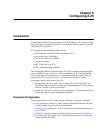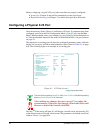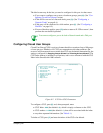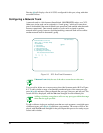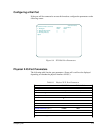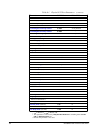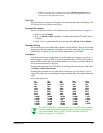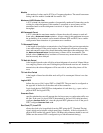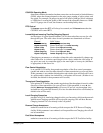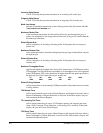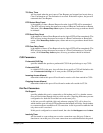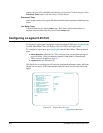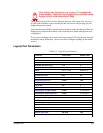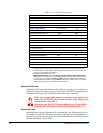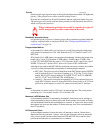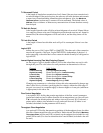
Configuring X.25 8-9
CSU/DSU Operating Mode
determines whether the attached modem connection can be normal or limited distance
(LDM), where the distance depends on the wire gauge, number of splice points, and
line speed. For example, 26 gauge wire and a line speed of 64K bps allows a distance
of 15000 feet. Lowering the speed to 56K increases the allowable distance to 18400
feet. If 19 gauge wire is used, the distances can be multiplied by three.
RTS Control
if
Constant
means that RTS will always be asserted, and if
External
means that the
CSU/DSU will control RTS.
Lowest/Highest Incoming/Two-Way/Outgoing Channel
are the ranges of logical channel numbers (LCNs) that subscribers can use for calls
through this port. The valid values for each parameter are determined as follows:
Channel
Valid Values
Lowest Incoming 1
through
Highest Incoming
Highest Incoming
Greater than/equal to
Lowest Incoming
Lowest 2-Way
Greater than
Highest Incoming
Highest 2-Way
Greater than/equal to
Lowest 2-Way
Lowest Outgoing
Greater than
Highest 2-Way
Highest Outgoing Lowest Outgoing
through
4095
Changing any parameter to a value that violates this order automatically changes any
other values now in violation, specifying the first value(s) within the valid range. If
any pair is not used, its constraints apply to the next higher or lower pair (whichever
is appropriate) in the above list.
Flow Control Negotiation
is an optional X.25 facility that permits negotiation of the flow control parameters
(packet and window sizes for either direction of data transmission) on a per call basis.
If this parameter is set to
N
, the default packet and window sizes will be used. If set to
Y
, a packet and/or window size included in a call packet will be used. (If either is not
included, the default for that parameter will be used.)
Throughput Class Negotiation
is an optional X.25 facility that permits negotiation of the throughput classes for either
direction of data transmission on a per call basis. If this parameter is set to
N
, the
default (
Maximum Throughput Class
) will be used. If set to
Y
, any throughput class
included in a call packet will be used. (If a class for either direction is not included, its
default value will be used.)
Local Charging Prevention
prevents calls (if
Y
) from being charged to this port. Incoming calls from the network
with Reverse Charging specified will be rejected; outgoing calls will have Reverse
Charging inserted if it is not already in the call packet.
Reverse Charge Acceptance
authorizes transmission of incoming calls that request the X.25 Reverse Charging
facility. If this parameter is set to
N
and a call requests Reverse Charging, the call will
not be transmitted.
Fast Select Acceptance
authorizes transmission of incoming calls that request the X.25 Fast Select facility.



